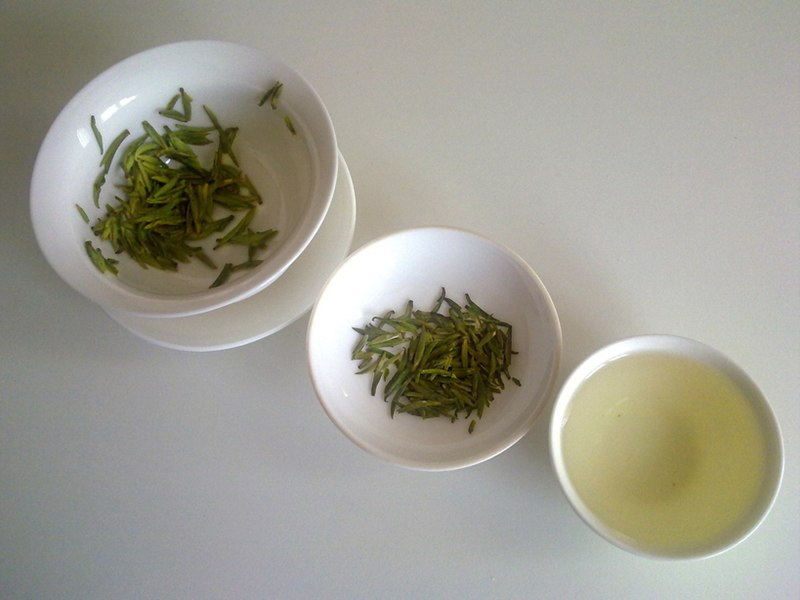Content Menu
● Understanding Green Tea Extract
● Mechanisms Behind Weight Loss
● Scientific Evidence Supporting Weight Loss Claims
● Potential Benefits Beyond Weight Loss
● Risks and Considerations
● How to Incorporate Green Tea Extract into Your Routine
● Conclusion
● FAQ
>> 1. How much green tea extract should I take for weight loss?
>> 2. Can I rely solely on green tea extract for weight loss?
>> 3. Are there any side effects associated with green tea extract?
>> 4. Is drinking green tea better than taking supplements?
>> 5. How long does it take to see results from green tea extract?
● Citations:
Green tea has been a staple in various cultures for centuries, celebrated not only for its unique flavor but also for its numerous health benefits. In recent years, green tea extract pills have gained popularity as a weight loss supplement. This article delves into the efficacy of green tea extract pills in promoting weight loss, examining scientific studies, mechanisms of action, potential benefits, and risks.

Understanding Green Tea Extract
Green tea extract is derived from the leaves of the *Camellia sinensis* plant. It is rich in antioxidants, particularly catechins, which are believed to contribute to many of its health benefits. The most prominent catechin in green tea is epigallocatechin gallate (EGCG), which has been studied extensively for its potential effects on weight management.
Mechanisms Behind Weight Loss
The potential weight loss benefits of green tea extract can be attributed to several mechanisms:
- Increased Metabolism: Green tea extract may enhance metabolic rate through thermogenesis, the process by which your body converts calories into heat. Studies suggest that the combination of caffeine and catechins can lead to increased energy expenditure.
- Fat Oxidation: Research indicates that green tea extract can promote fat oxidation, helping the body utilize fat as a source of energy, especially during exercise.
- Appetite Regulation: Some studies suggest that green tea may help regulate appetite hormones, potentially leading to reduced caloric intake.
Scientific Evidence Supporting Weight Loss Claims
While many studies support the idea that green tea extract can aid in weight loss, results are often modest and vary among individuals. Here are some key findings from recent research:
1. Clinical Trials: A review published in 2020 found that consuming at least 500 mg of green tea extract daily for 12 weeks resulted in reductions in body weight and BMI among participants.
2. Mixed Results: Other studies report minimal or statistically insignificant weight loss effects from green tea extract. For instance, a meta-analysis indicated that while there were some positive outcomes, they were not clinically significant for most individuals.
3. High-Dose Studies: Some trials involving high doses of EGCG (up to 856 mg daily) showed significant weight loss and reductions in waist circumference among women with central obesity. However, these doses can be risky and should be approached with caution.
4. Animal Studies: Research involving mice on a high-fat diet that consumed decaffeinated green tea extract and exercised regularly showed sharp reductions in body weight and improvements in health markers such as blood glucose levels and insulin resistance[2].
5. Long-Term Effects: A systematic review found that long-term consumption of green tea extract could lead to significant reductions in body mass index (BMI) and body fat percentage[8].

Potential Benefits Beyond Weight Loss
In addition to weight management, green tea extract offers several health benefits:
- Heart Health: Regular consumption of green tea has been associated with improved cardiovascular health due to its ability to lower cholesterol levels and improve blood pressure.
- Antioxidant Properties: The high antioxidant content in green tea extract helps combat oxidative stress and inflammation in the body.
- Blood Sugar Regulation: Some studies suggest that green tea extract may help regulate blood sugar levels, which is beneficial for individuals with insulin resistance or type 2 diabetes.
- Brain Health: The catechins in green tea may help protect brain cells from deterioration, potentially reducing the risk of neurodegenerative diseases such as Alzheimer's and Parkinson's disease[3].
- Liver Function Support: Green tea extracts have shown promise in improving liver function and protecting against liver diseases like nonalcoholic fatty liver disease (NAFLD)[3].
Risks and Considerations
Despite its benefits, there are potential risks associated with high doses of green tea extract:
- Liver Damage: High doses of EGCG have been linked to liver toxicity in some cases. Individuals taking supplements should monitor their liver function and consult healthcare providers before starting any regimen[21].
- Caffeine Sensitivity: Green tea extract contains caffeine, which can lead to side effects such as anxiety, insomnia, and increased heart rate in sensitive individuals. It is essential to consider total daily caffeine intake from all sources[4].
- Interactions with Medications: Green tea extracts may interact with certain medications, including blood thinners and antidepressants. Always consult a healthcare professional before combining supplements with prescription drugs[24].
- Gastrointestinal Issues: Some users report gastrointestinal side effects such as nausea, diarrhea, or abdominal pain, especially when taken on an empty stomach[17][12].
How to Incorporate Green Tea Extract into Your Routine
If you decide to try green tea extract pills for weight loss or other health benefits, consider the following tips:
- Choose Quality Supplements: Look for reputable brands that provide standardized extracts with known concentrations of EGCG.
- Monitor Dosage: Start with a lower dose (around 250 mg per day) and gradually increase it while monitoring for any side effects.
- Combine with Healthy Lifestyle Choices: For optimal results, combine green tea extract supplementation with a balanced diet rich in fruits, vegetables, lean proteins, whole grains, and regular physical activity.
- Stay Hydrated: Drink plenty of water throughout the day to support overall health and metabolism.
Conclusion
Green tea extract pills may offer modest weight loss benefits when combined with a healthy diet and regular exercise. While scientific evidence supports some positive effects on metabolism and fat oxidation, results can vary widely among individuals. It is crucial to approach supplementation cautiously due to potential risks such as liver damage and interactions with medications.
For those considering green tea extract as part of their weight loss journey, it is advisable to consult healthcare professionals to ensure safety and efficacy.

FAQ
1. How much green tea extract should I take for weight loss?
The recommended dosage varies but typically ranges from 250 mg to 500 mg per day. It's essential to consult a healthcare provider for personalized advice.
2. Can I rely solely on green tea extract for weight loss?
No, while it may aid weight loss efforts, it should be combined with a balanced diet and regular exercise for effective results.
3. Are there any side effects associated with green tea extract?
Yes, possible side effects include liver damage at high doses, caffeine-related issues (like anxiety), and interactions with certain medications.
4. Is drinking green tea better than taking supplements?
Drinking several cups of green tea daily can provide health benefits without the risks associated with concentrated extracts; however, supplements offer higher doses of catechins.
5. How long does it take to see results from green tea extract?
Results can vary; some individuals may notice changes within a few weeks when combined with lifestyle changes, while others may take longer.
Citations:
[1] https://www.drugs.com/npp/green-tea.html
[2] https://www.psu.edu/news/research/story/research-suggests-green-tea-exercise-boost-weight-loss-health
[3] https://senchateabar.com/blogs/blog/green-tea-pills
[4] https://www.webmd.com/vitamins/ai/ingredientmono-960/green-tea
[5] https://www.ncbi.nlm.nih.gov/books/NBK547925/
[6] https://pmc.ncbi.nlm.nih.gov/articles/PMC3649093/
[7] https://pubmed.ncbi.nlm.nih.gov/26093535/
[8] https://pubmed.ncbi.nlm.nih.gov/38031409/
[9] https://senchateabar.com/blogs/blog/green-tea-side-effects
[10] https://www.healthline.com/nutrition/10-benefits-of-green-tea-extract
[11] https://www.urmc.rochester.edu/encyclopedia/content?contenttypeid=19&contentid=greenteaextract
[12] https://www.vumc.org/poison-control/toxicology-question-week/march-12-2021-what-are-adverse-effects-green-tea-extract
[13] https://examine.com/supplements/green-tea-extract/
[14] https://cdn-prod.medicalnewstoday.com/content/images/articles/320/320540/green-tea-in-cup-with-tea-leaves-on-wooden-spoon.jpg?sa=X&ved=2ahUKEwj6uYeO7OyKAxXQA7kGHUvxLuoQ_B16BAgOEAI
[15] https://pmc.ncbi.nlm.nih.gov/articles/PMC8406948/
[16] https://www.medicalnewstoday.com/articles/269538
[17] https://www.webmd.com/drugs/2/drug-76714/green-tea-leaf-extract-oral/details
[18] https://www.healthline.com/nutrition/egcg-epigallocatechin-gallate
[19] https://www.npr.org/sections/thesalt/2015/11/10/432727282/will-drinking-green-tea-boost-your-metabolism-no-so-fast
[20] https://www.healthline.com/nutrition/green-tea-and-weight-loss
[21] https://pmc.ncbi.nlm.nih.gov/articles/PMC3746392/
[22] https://efsa.onlinelibrary.wiley.com/doi/10.2903/j.efsa.2018.5239
[23] https://www.medicalnewstoday.com/articles/320540
[24] https://www.nccih.nih.gov/health/green-tea
[25] https://ajcn.nutrition.org/article/S0002-9165(22)04202-2/fulltext
[26] https://www.canada.ca/en/health-canada/services/food-nutrition/public-involvement-partnerships/notice-modification-list-permitted-supplemental-ingredients-permit-use-green-tea-extract-supplemental-ingredient-foods/document.html
[27] https://pmc.ncbi.nlm.nih.gov/articles/PMC3908530/






























